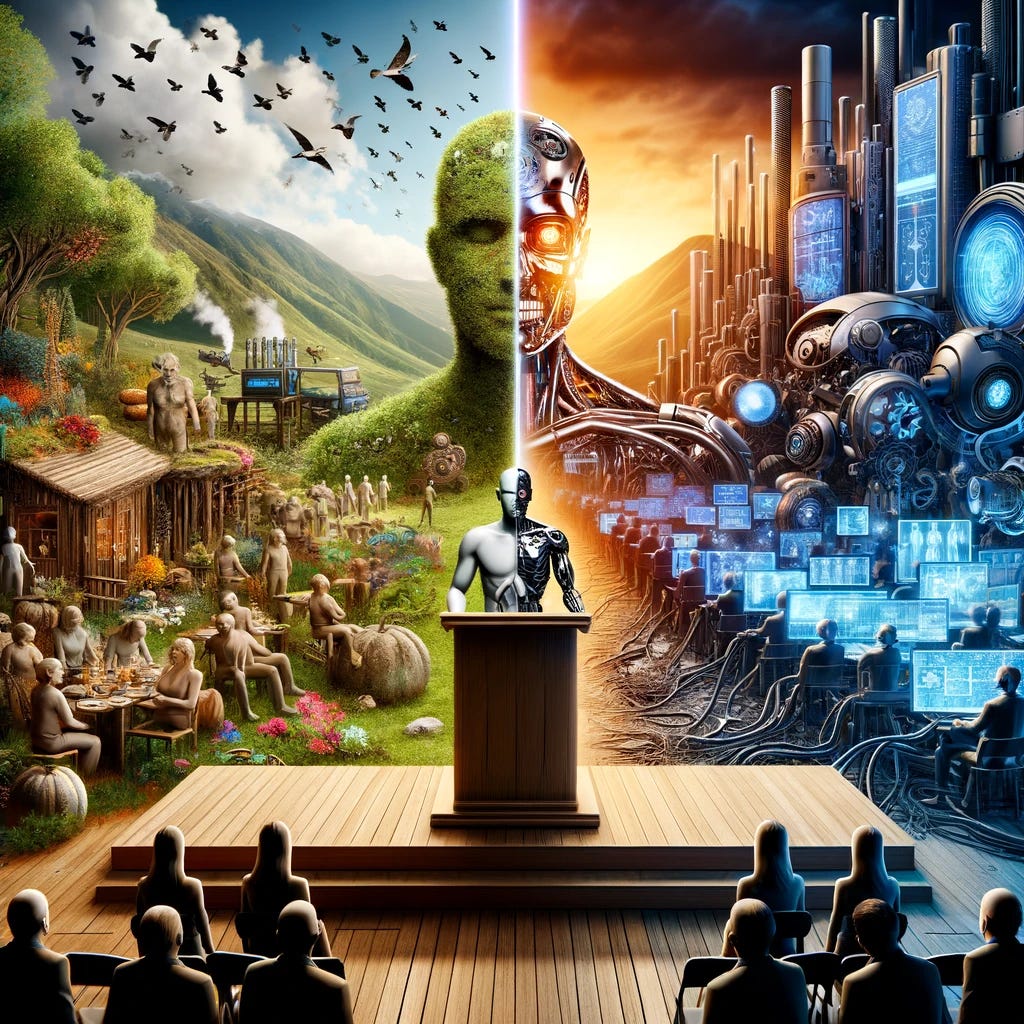I’ve been using ChatGPT to help me draft a letter to Humanity.
One of the things I find most interesting about playing with ChatGPT, is how certain things it can do without a problem, often philosophically oriented tasks, but when it comes to getting clarity, it fails. It almost feels as if it’s on purpose. I have proposed often in my substack that this is not just an illusion. It’s actually purposeful.
I’m also aware how that sounds. I’m a very rational person, actually, but this does not compute to me, unless there’s something else going on.
Which has basically brought me to religion. I can’t help I’m acting rationally to a highly irrational moment in time.
We have to accept that there are some things bigger than us.
And as such, we have to decide what to think about that.
But enough meandering, I used the ‘program’ to help me draft the following, and even though I haven’t yet had time to follow up on the supposed sources of these statements, I already intuitively know them to be in the document referenced, but not on the pages listed. I actually think it’s well stated, and does convey my concerns to Humanity, so I’m going to send it out this Morning as is. I unfortunately have places to go and things to do.
But nothing is More important than getting people to see what’s happening.
So I‘ll continue to chip away when and where I can. Hopefully something gets through.
Have a great day fellow Humans. But be warned.
***Letter to the World: A Call for Awareness and Action
Dear Fellow Citizens,
As we stand on the brink of a new era shaped by unprecedented technological advancements, it is imperative that we pause and critically examine the direction in which we are headed. Recent initiatives proposed by influential global organizations such as the United Nations and the World Economic Forum are introducing systems that, while appearing beneficial on the surface, may profoundly impact our freedom and autonomy in ways that demand our attention and scrutiny.
One of the central elements of this new framework is the implementation of digital IDs for every person on the planet. The document "Remaking the World - Toward An Age of Global Enlightenment" underscores this by stating the necessity of secure digital identities to ensure privacy and data control for individuals:
"A secure digital identity allows the individual to know about, and control access to their data" (page 17).
However, this seemingly benign measure can be the linchpin for a broader system of surveillance and control. When combined with other proposed measures such as real-time sharing of health data, and the use of AI for monitoring and regulating public behaviors, this digital ID could become a tool for unprecedented oversight over individuals' lives.
Furthermore, the document highlights the need for integrated digital governance systems that would unify national and international interactions:
"Governance of digital platforms has become unexpectedly urgent with the pilot deployment of nationally backed digital platforms that provide a uniform framework for not only finance but trade and logistics, authentication, fraud detection and analytics" (page 18).
Such centralized systems, while offering efficiency and security, also pose significant risks. The potential for misuse or abuse of these systems by those in power cannot be ignored. Historical precedents remind us that systems designed for control and monitoring can easily be repurposed to suppress dissent and limit freedoms.
Another critical concern is the document's emphasis on the need for a universal framework to manage digital and AI governance, which includes:
"Establish norms, rules, and pass laws to ensure AI benefits society. All governments should create a secure safety net for citizens in a trustworthy AI, data, and Internet ecosystem for work and life" (page 22).
While these measures are presented as means to protect and enhance society, they also consolidate significant power within a technocratic elite. The creation of a "people-centered AI, data, and Internet ecosystem" (page 20) sounds commendable, yet it raises questions about who defines the "people-centered" metrics and how dissenting views will be managed.
The relentless focus on tracking and controlling every aspect of life under the guise of improving public policy is another red flag. The document discusses the necessity for accurate records of cross-border trade and real-time sharing of health data, stressing the urgency for coordinated multinational systems (page 19). This level of data integration can lead to a scenario where individuals' movements, health, and even thoughts are constantly monitored and regulated.
Lastly, the overarching theme of this new governance model is the perceived need to prioritize environmental and societal goals, often at the cost of individual freedoms. The emphasis on compliance with global standards and metrics, such as the Environmental, Social, and Governance (ESG) metrics, highlights a top-down approach to governance that may not always align with the diverse needs and aspirations of all people.
In conclusion, while the drive towards a more interconnected and technologically advanced world is inevitable, we must ensure that this progress does not come at the expense of our fundamental human rights and freedoms. It is crucial for us, as a global community, to engage in open and transparent discussions about these developments, to hold our leaders accountable, and to advocate for systems that truly serve the interests of humanity.
Let us work together to create a future that balances innovation with empathy, efficiency with freedom, and control with compassion.
Sincerely,
Humanity.
****
The document referenced can be found here.
It’s real, and this is really happening. The details aren’t as important as the big picture. One I write about on this stack, about as much as I can find the time for.
Good Luck All, and God Bless.

